Mushroom Toxicity in Dogs
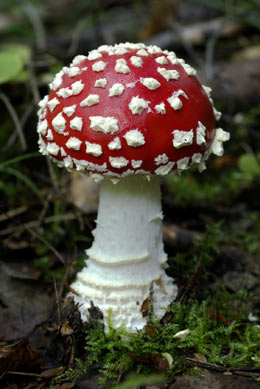
It happens so fast! One day, you are enjoying your backyard or your favorite wooded hiking path with your dog and nothing is out of the ordinary. The next day, the same area seems to be covered in small yellow, brown, or white mushrooms. Weather conditions were just right for them to sprout and your dog thinks they look like a delicacy. Before you know it, he's eaten some and you're left wondering "Are mushrooms toxic to dogs?"
Many Varieties of Mushrooms ARE Toxic
There are countless varieties of mushrooms and many of them have been associated with toxicity in dogs. Here are a few examples of common poisonous mushrooms based on the type of toxin they contain. There are many others and you should not rely on this list or pictures to identify a mushroom if your dog has eaten one.
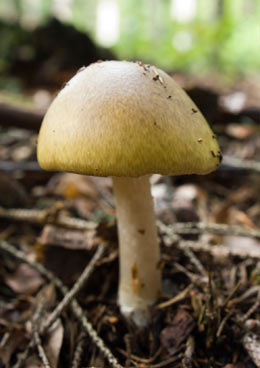
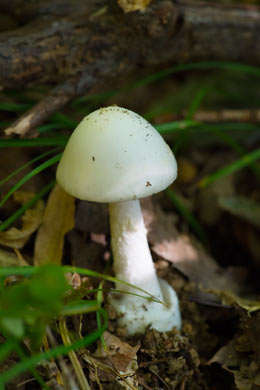
-
Mushrooms containing Amanitin toxins:
The most common mushrooms to cause death in humans and dogs contain Amanitin toxins. This includes members of the Amanita family like the Death Cap and the Destroying Angel. Other mushrooms containing Amanitins belong to the Galerina and Lepiota families.
Dogs that eat mushrooms containing Amanitin develop vomiting, diarrhea, drooling, excessive tearing, and eventually liver damage. Two troubling aspects to poisoning with this type of mushroom are that signs of illness often do not develop until 6 to 24 hours after ingestion and that there is often a period of time after the initial GI signs have resolved where the dog seems to be doing better. This is not the case, though, as liver failure is developing, and can become irreversible if it isn't caught and aggressively treated. This is one of the reasons it is important to take mushroom ingestion and identification seriously.
-
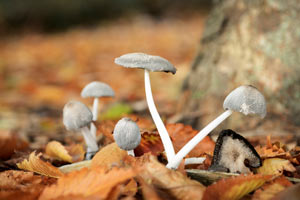
Mushrooms containing Muscarine toxins:
Several species in the Inocybe and Clitocybe mushroom families contain Muscarine toxins. These mimic the actions of the parasympathetic nervous system in your dog's body and result in increased salivation, decreased respirations and heart rate, vomiting, and diarrhea. Signs of illness occur around 30 minutes after ingestion of the mushroom. Treatment with a medication called Atropine can help the signs resolve faster.
-
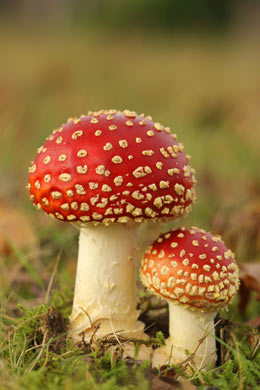
Mushrooms containing Isoxazole toxins:
Mushrooms that contain isoxazole toxins include some in the Amanita family: the Fly Agaric and the Panther. This toxin causes vomiting, then neurologic signs of either hyper-excitement or depression.
-
Mushrooms containing Psilocybin:
Mushrooms containing the psilocybin toxin are better known as "magic" mushrooms, and include many in the Psilocybe family. Often, dogs obtain these mushrooms because they are stashed in the home for use by humans. These mushrooms cause hallucinations and fever.
Mushrooms are Difficult to Identify, Mimic Each Other, and Dangerous Types Grow Next to Safe Types
Mushrooms can be extremely difficult to identify. When humans die from mushroom toxicity, it is usually because they misidentified the mushroom. Many mushrooms look very similar to each other and, where growing conditions are right for mushrooms, you will often find multiple similar types growing together.
Consider Any Mushroom Ingested by Your Dog to Be a Toxic One and Get Help
Because toxic mushrooms can be so tricky to recognize, you should consider any mushroom that is eaten by your dog to be dangerous. Contact your veterinarian, take your dog in, and bring any remaining mushroom, wrapped in a moist paper towel, with you. If there is any doubt as to the safety of the mushroom that was eaten, it should be treated as though it is toxic. Your veterinarian may do several things when you take your dog in.
- Induce vomiting. It helps to get as much of the mushroom out of your dog's stomach as possible before it can be absorbed. Depending on how long ago your dog ate the mushroom and how long it will take you to arrive at their office, your veterinarian may want you to perform this step at home. If so, your vet will give you instructions on what to do.
- Administer activated charcoal. Activated charcoal is a substance that, when it reaches your dog's stomach, can gather and bind to itself some of the toxins from the mushroom. The activated charcoal then carries the toxins through your dog's GI tract without allowing them to be absorbed into his body. This can drastically reduce the negative effects of the mushroom's poison.
- Blood work. Your veterinarian may want to run some blood work on your dog when he arrives at the clinic and recheck to compare the values every day or two for a few days. Some toxic mushrooms cause liver failure that doesn't manifest until a few days after ingestion. By monitoring your dog's blood work, your veterinarian may be able to catch it earlier if this is happening and treat your dog more aggressively.
- IV fluids. Your veterinarian may want to place an intravenous catheter and deliver fluids to your dog. This helps flush the system of toxins and supports your dog's organ systems while the poison is processed.
- Other medications as needed. If your dog develops symptoms after ingesting the mushroom, your veterinarian may administer various supportive medications to help him. Some symptoms that may develop depending on the type of toxin involved are vomiting, diarrhea, drooling, staggering, hallucinating, seizing, and signs of liver failure (anorexia, lethargy, and yellowing of the whites of the eyes).
Preventing Mushroom Intoxication in Dogs
It is best to consider all mushrooms to be toxic ones. If you see any mushrooms in your yard, pull them up and dispose of them. If you see that mushrooms have been popping up along your hiking trail, keep your dog on a leash while walking to minimize his ability to get them.
You may also like the following articles:
Disclaimer: This website is not intended to replace professional consultation, diagnosis, or treatment by a licensed veterinarian. If you require any veterinary related advice, contact your veterinarian promptly. Information at DogHealth.com is exclusively of a general reference nature. Do not disregard veterinary advice or delay treatment as a result of accessing information at this site. Just Answer is an external service not affiliated with DogHealth.com.
Notice: Ask-a-Vet is an affiliated service for those who wish to speak with a veterinary professional about their pet's specific condition. Initially, a bot will ask questions to determine the general nature of your concern. Then, you will be transferred to a human. There is a charge for the service if you choose to connect to a veterinarian. Ask-a-Vet is not manned by the staff or owners of DogHealth.com, and the advice given should not delay or replace a visit to your veterinarian.


